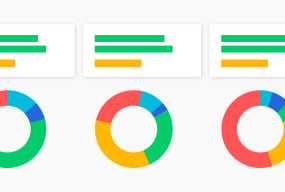Support your most important design decisions with insights into human behavior. Intentionally and systematically gather customer data to deliver superior products with confidence.

Reimagining Cisco’s IT Training Platform
View the workInsights & Strategy
Conduct user research to inform confident business strategies
Work with Blink UX
Fuel your product strategy with consumer insights
Create a lasting vision for your company
Leverage user insights to envision new opportunities and set clear, achievable goals for an overall business strategy that inspires and aligns teams today and tomorrow.
Build a strategy for resilience, transformation, and growth
Roadmaps are meant to stand the test of time and scale as your business grows. By centering your goals on user needs and tracking those needs over time, you’ll set your business up to withstand whatever comes its way.
Grow market share and lead your industry
Uncovering gaps in the market will unlock new opportunities to lead. Find the gaps with mixed methods research, then claim your stake.

The research that transformed a luxury brand into a market leader
How three years of research empowered a high-end appliance brand to outrank its competition.
Our Insights & Strategy capabilities
Foundational Research
Conduct customer research, define your target audience, gain qualitative and customer insights, and capture subjective user feedback on your product or experience.
Hardware Research
Test physical product components to improve performance, reliability, and functionality. Learn more: What to Know Before Starting Hardware Research
Accessibility Research
Assess how well your products support people with disabilities and design beyond standard compliance to build customer trust and grow market share.
Experience Strategy
Align company goals with user needs to create consistent and meaningful experiences across product or service touchpoints for a rigorous business level strategy.
Evaluative Research
Gather customer feedback through usability testing and analysis during the product development process and refine your concepts prior to launch.
Insights & Strategy: Answering the essentials
How do I assess market potential for a new product?
Competitive analysis, user research, and market testing are great methods to determine where your product fits in. Once you find the gaps, you can build differentiated products and services that stand out to your audience.
Why is UX research critical for building successful products?
Gathering feedback from real users and applying those insights to craft a strategy helps teams quickly bring products and services to market, with a lower risk of failure and a confident roadmap for improvements over time. Related: Is User Research Worth the Cost?
Does Blink conduct user research for existing products?
Yes! We conduct user research at every phase of the product development cycle.
What is the best time to conduct user research?
Conducting research early and often throughout the product development cycle is best; however, late-stage research can be just as valuable by helping companies anticipate market issues, inform mitigation, and prioritize short- and long-term improvements.


















